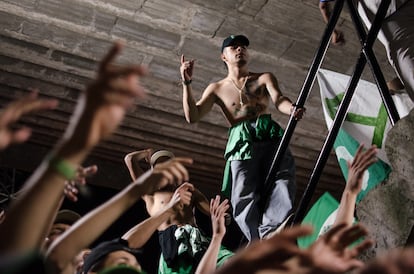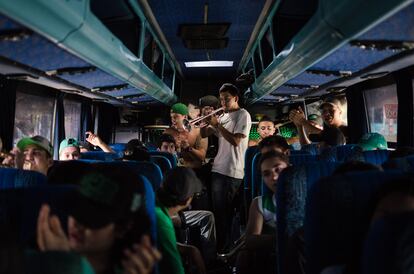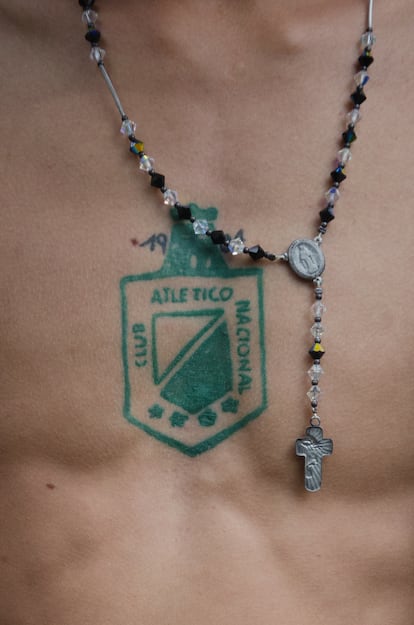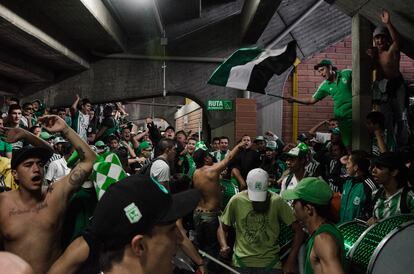The ‘war’ between two major Colombian soccer clubs highlights tension between management and fans
Sunday’s riots at a football stadium in Medellín came after months of strife between team executives and fans

The authorities are evaluating whether the chaos that took place last Sunday at the Atanasio Girardot stadium in Medellín was planned. Audios revealed by local station W Radio reveal that the riots — which occurred just minutes before the soccer match between Atlético Nacional and América de Cali — were premeditated by fans of the former team, as a way of punishing the management.
“We’re going to start a war against Nacional and its leaders,” a man is heard saying in an audio recording.
For weeks, fans in Medellín have been protesting against Atlético Nacional’s executives and slamming them on social media, claiming that the team’s leadership has “broken” the relationship. According to the press, the most-dedicated followers of the soccer team (ultras) were being denied complimentary tickets for home games. However, one paper reports that they were offered 500 free tickets.
In the recording, leaders of the fanbase are heard giving orders to carry out attacks and damage the soccer club, supposedly as retaliation for not being granted benefits by the management.
“We’re going to be like [Argentina’s organized fans]... we’re going to look for tickets for those who don’t have them close to the field,” says a supposed member of Los del Sur – the largest and most popular organized ultras group within Atlético Nacional.

This past Sunday, at around 6:00 p.m. — just before the game between Nacional and América de Cali was set to begin — a riot erupted in the stands, eventually spreading throughout the stadium. The authorities — who failed to contain the violence — had no choice but to announce the evacuation of the stadium over the loudspeakers. The images show men, presumably members of Los del Sur, jumping onto the field and throwing objects at the riot police.
The riot — which left 89 people injured — has revealed a level of violence that is brewing far from the fields, related to the agreements made by the managers of the team and fan groups. In Colombia, soccer clubs are private companies that build relationships with large groups of fans through a system of incentives, such as free tickets, or the chance to interact with the players. Lately, Atlético Nacional’s leadership has been attempting to change this balance: “All fans are equally important and, for this reason, we firmly believe that no one should have privileges over others,” said a spokesperson, in an attempt to justify the recent decision to revoke special treatment.
#DeportesW | El partido entre Atlético Nacional y América se jugaría mañana a las 10:00 a.m. a puerta cerrada. Esto debido disturbios entre la barra ‘Los del Sur’ y el ESMAD en el Estadio Atanasio Girardot que impidieron que el encuentro se disputara hoy.https://t.co/DnV0Jy099X pic.twitter.com/DcdFIXx54N
— W Radio Colombia (@WRadioColombia) April 17, 2023
However, Juan Pablo Ramírez — secretary of the municipal government of Medellín — points out that the leadership of the team bears some responsibility for the tense situation. “This is a problem that has to do with fans who chose the wrong path… but it’s also because of a leadership that is arrogant and has stopped listening to its fans,” Ramírez told W Radio.
Congressman Daniel Carvalho — who worked for the supporter groups in Medellín when he was a city councillor — has denounced a “clientization” of the support associations: “On the one hand, the teams simply see [Los del Sur] as customers who are given tickets and who have to be paid certain fees to calm them down. On the other hand, the [local politicians] see them as clients who are given benefits — such as contracts or positions — in exchange for political support. In both cases, [the position of being a soccer fan] is degraded,” the congressman tells EL PAÍS by phone. He believes that the fans aren’t being recognized for their power as a social movement — rather, their role is seen as being merely “transactional.”

Carvalho considers the contractual relationships between the organized fanbase, the clubs and the mayor’s office to be legitimate, but he warns that smooth-functioning will always depend on the conditions and objectives of these relationships.
“An [organized supporters’ group] is a social movement… it has a lot of initiatives and needs a budget to function. It’s good that this budget comes from known and legal sources. [But there’s] a problem if this relationship has merely transactional or political objectives: the objective of the [supporters’] movement is blurred,” the congressman notes.
Carvalho has long worked against the stigmatization of the Medellín fanbase: “Packing all the people under the same blanket is a stigmatization against which we have fought for a long time… it ignores the social processes that have already distanced the idea of the [football fan] as a criminal.”
In the last six months, Carvalho and other congresspeople have criticized the administration of President Gustavo Petro for having shown “little interest” regarding the rise in violence in football stadiums.
“I had never given it any importance until what happened yesterday [on Sunday],” the politician says. “The government must keep alive all the instances of dialogue that have already been created. It has to update the Ten-Year Football Plan, while the National Development Plan should explicitly include a commitment to work with the supporters’ movements.”
The Ministry of the Interior has convened a National Football Commission for April 27 to address violence in stadiums. This past February, a Tolima fan invaded the field at the Manuel Murillo Toro stadium, in Ibagué. He hit Daniel Cataño, a player from Millonarios F.C. Other recent episodes have highlighted the issue of violence in Colombian soccer, such as the throwing of stones at the buses that transport players.
Germán Gómez — a soccer analyst and writer — opines that the “disruptive” logic of these groups of fans compared to traditional fans means that they are usually associated with violence. But what happened on Sunday, he explains, has a different context compared to riots between fans of rival teams or against players.
“This is a response to a change in the relationship policy of a team with the supporters’ movements,” Gómez explains. “[This was] a premeditated act that seeks to generate chaos and affect the club, due to the decisions it has made. This changes the emphasis on where violence in soccer has always occurred. In this case, [the violence] wasn’t spontaneous, motivated by the ‘heat’ of the game. Rather, it was a planned action. It’s an issue that has to do with the relationship that the club has with its fans.”
Los del Sur rioted in a demonstration of their power. The match ended up being postponed due to the lack of safety guarantees. Eight people were arrested, while the mayor of Medellín, Daniel Quintero, announced that the stadium wouldn’t be loaned to the soccer club until total security could be guaranteed.
“We will not lend the stadium to Atlético Nacional until minimum security conditions are agreed upon between the [fanbase] and the management. Surveillance is to be paid for by the team. I prefer police officers to be taking care of the people in the streets,” Quintero said.
The Colombian Professional Soccer Association has noted that, while the club was warned of possible violent events in the stadium, it was difficult to foresee the chaos. “This exceeds all security limits. The mayor said that he had 800 policemen [protecting the stadium]... but it’s a difficult task even with 800 troops,” said Fernando Jaramillo, the president of the association, on Monday.
Felipe Muñoz, one of the leaders of Los Del Sur, has told the media that what happened on Sunday was the culmination of a series of events that, he says, have distanced the fans from the team. “The current relationship of the team’s leadership with its citizens and its fans… a lot of things ended up exploding,” he told Caracol Radio.

Sign up for our weekly newsletter to get more English-language news coverage from EL PAÍS USA Edition
Tu suscripción se está usando en otro dispositivo
¿Quieres añadir otro usuario a tu suscripción?
Si continúas leyendo en este dispositivo, no se podrá leer en el otro.
FlechaTu suscripción se está usando en otro dispositivo y solo puedes acceder a EL PAÍS desde un dispositivo a la vez.
Si quieres compartir tu cuenta, cambia tu suscripción a la modalidad Premium, así podrás añadir otro usuario. Cada uno accederá con su propia cuenta de email, lo que os permitirá personalizar vuestra experiencia en EL PAÍS.
¿Tienes una suscripción de empresa? Accede aquí para contratar más cuentas.
En el caso de no saber quién está usando tu cuenta, te recomendamos cambiar tu contraseña aquí.
Si decides continuar compartiendo tu cuenta, este mensaje se mostrará en tu dispositivo y en el de la otra persona que está usando tu cuenta de forma indefinida, afectando a tu experiencia de lectura. Puedes consultar aquí los términos y condiciones de la suscripción digital.









































